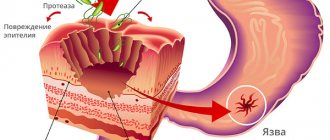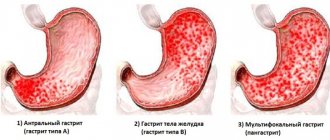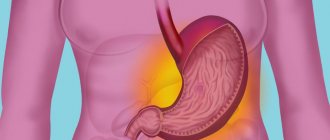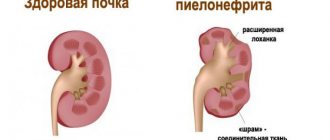Diseases of the stomach and intestines have long become part of the life of an ordinary city resident. Medical statistics claim that up to 90% of the population of our country suffers from gastric ailments in one form or another, and the symptoms of such diseases are known to everyone. Stomach problems can be of a different nature - from banal heartburn after an unsuccessful lunch to serious tumors. Therefore, it is important to know all the types and symptoms of such diseases in order to make a diagnosis at the first signals and begin immediate treatment.
Classification of gastric diseases
There is no single classification of gastric diseases in humans in science - the symptoms of indigestion are too closely related to pathologies of the esophagus, duodenum and other parts of the intestine, and the pancreas. International Classification of Diseases 10 combines diseases of the stomach, duodenum (part of the small intestine) and esophagus into one group, and scientists offer several reasons for their systematization.
For stomach problems, discomfort occurs below the sternum
The most popular classification divides disorders of the main digestive organ into 4 groups - according to causes, symptoms, specific treatment and other factors.
- Functional disorders (there is no specific disease, only a violation of the motor and secretory functions of the stomach is observed). These are acidity disorders, atony, aerophagia, irritable stomach syndrome, etc.
- Various inflammations (or inflammatory-dystrophic diseases). These are gastritis, ulcers, rare gastric tuberculosis and syphilis.
- Infectious and parasitic diseases (exposure to Helicobacter Pilori and other dangerous pathogens).
- Polyps and tumors (abnormal growths of stomach tissue, including precancerous and cancerous conditions).
Any stomach disease can be chronic or acute. Acute attacks usually occur due to the influence of external factors (infection, poisoning, etc.). Chronic ones can develop over the years under the influence of a whole complex of harmful causes if treatment is not completed in a timely manner. These diseases occur cyclically in both men and women - periods of remission are followed by exacerbations.
Diagnostic examination
To find out the exact cause of abdominal pain and other symptoms that worry the patient, the doctor conducts a diagnostic examination. Only after this can you begin therapy. As practice shows, the earlier the disease is detected, the greater the chances of quick and effective treatment. This will also prevent the development of serious complications.
Gastrointestinal tract research methods
Diagnostics includes a number of procedures:
- general examination, including palpation of the abdominal cavity, visual examination of the patient’s skin, listening to the gastrointestinal tract;
- biopsy (laboratory examination of the patient’s tissues and cells);
- magnetic resonance imaging (MRI);
- X-ray examination;
- Ultrasound of the abdominal organs;
- colonoscopy and gastroscopy (procedures to assess the condition of the walls of the intestines, stomach and esophagus);
- coprogram (laboratory stool analysis);
- general blood and urine analysis.
Functional stomach disorders
Stomach dysfunction
Functional diseases of the intestines and stomach are quite common - a third of young men and women who go to the doctor with stomach complaints have such problems. Functional disorders are not accompanied by a specific disease, inflammation (if any) is insignificant.
Doctors believe that functional gastric problems can be caused by the following factors:
- disordered diet and bad eating habits;
- constant overwork and nervous overload;
- neurotic disorders;
- failure of the endocrine system;
- food allergies;
- consequences of hypovitaminosis or taking medications.
Symptoms of a functional disorder are manifested by nausea and vomiting, a person suffers from constant heartburn and heaviness in the abdomen, appetite may disappear, and there are often problems with stool.
List of functional diseases of the stomach
- gastric hypotension and hypertension;
- acute dilatation of the stomach (paralysis of the neuromuscular gastric wall);
- aerophagia (swallowing air with food and exhausting belching);
- stomach cramps;
- nervous nausea and vomiting;
- violation of acid-forming function, etc.
Major gastric diseases
Stomach with gastritis
Functional disorders are traditionally considered separately; all other groups of gastric ailments are usually combined into a general list. The main gastric diseases in humans include the following.
Gastritis
This is an inflammatory process in the mucous membrane of the digestive organ; there are chronic and acute forms. Gastritis in men and women is the most favorable basis for the development of more serious problems of the stomach and intestines. Gastritis comes in several different forms, the most dangerous being atrophic.
Peptic ulcer
Perforated stomach ulcer
This is the name given to the presence of ulcers and erosions on the internal mucous membrane of the stomach or intestines (duodenum). Erosion means that the destructive process has not yet affected the internal tissues of the organ; with an ulcer, several gastric layers are already affected. With this diagnosis, perforation and peritonitis may develop.
Postoperative illnesses. All diseases associated with surgery are divided into 2 categories. The first is complications immediately after surgery that develop within 8 days (nausea, vomiting, heaviness, bleeding, intestinal obstruction). The second is the divergence of the seams, which also appears within a week.
Neoplasms and tumors
Stomach polyps
Neoplasms in the human stomach can be benign or malignant. Among the first are polyps, fibromas, neuromas, etc. Malignant ones are cancer itself.
There is also a group of pathologies such as precancerous diseases of the stomach. Although the exact causes of cancer are still unknown, doctors have found out which gastric pathologies most often become the background for the development of a malignant tumor in humans. These are ulcers, chronic gastritis (especially atrophic) and polyps.
Factors of occurrence
A common cause of stomach and duodenal ulcers is a stress factor. Emotional experiences reduce the body’s protective properties and lead to disruption of the functioning of organs, including the gastrointestinal tract. Other causes of the disease:
- Bad eating habits
. Due to unhealthy food, hydrochloric acid cannot eliminate bacteria, and the protective properties of the stomach are reduced. - Infection with the bacterium Helicobacter pylori
. It has the property of destroying the effect of hydrochloric acid, causing damage to the surface layers of the epithelium. Infection occurs through the oral cavity, the bacterium enters the body with dirty food, water, and from mother to fetus. - Use of medications
. One of the side effects of many medications is a negative effect on the gastric tract. Taking indomethacin, aspirin, diclofenac, ibuprofen, and butadione has a negative effect. Cytostatics and antihypertensive drugs can also provoke ulcerative lesions. - Consequences of other diseases
- tuberculosis, diabetes, hepatitis, pancreatitis, syphilis and others. - Hereditary factor
. It has been established that peptic ulcer disease is most often transmitted through the male line; the risk of occurrence is thirty percent higher in people with the first blood group.
With strong human immunity, an ulcer may not develop, even if the Helicobacter pylori bacterium is present in the body.
Signs of stomach diseases
The symptoms of stomach diseases are difficult to confuse with something else; they are the same for children and for adult men and women.
However, medical statistics say that the fair sex more often suffers from stomach ailments, so unpleasant signals mainly appear in women.
At the same time, there are diseases that develop mainly in men - for example, ulcers.
Signs of stomach problems
The main signs of stomach diseases are:
- loss of appetite (complete or partial);
- belching (rotten, bitter, sour or regular belching of air);
- heartburn;
- any pain in the epigastric zone;
- nausea and vomiting;
- constipation and diarrhea (a clear signal of problems with both the stomach and intestines);
- change in stool color;
- sudden weight loss for no obvious reason;
- fever, pale skin, cold sweat.
Different signs may indicate different diseases. Thus, periodic pain is a clear signal of gastritis or ulcers, belching usually occurs with gastritis, and heartburn often appears with decreased muscle tone of the stomach.
Special signs are found in malignant tumors . In both male and female patients, cancer always goes through 3 stages. At the first stage, the patient suffers from belching and heartburn, apathy and lethargy arise, and for some unknown reason weight drops. At the second stage, weight decreases, constant pain appears, nausea and vomiting almost never stop, and stomach bleeding begins. At the third stage, appetite disappears completely (it is simply impossible to eat), excruciating pain is no longer only in the stomach, but under the right ribs, in the back, and can radiate to the bones.
Summarizing
It seems that minor ailments are the norm in our lives. In fact, even mild stomach discomfort can be a signal of a serious illness. Remember that a disease identified at an early stage is easier to treat, and during the treatment process it will be possible to minimize discomfort and discomfort. It is very important to make an appointment with a gastroenterologist as soon as alarming symptoms make themselves felt. The doctor will help detect the disease and overcome it in time. Be healthy!
https://youtu.be/t49u9ZzG1gQ
Treatment of stomach diseases
Any stomach disease requires immediate treatment - even seemingly harmless heartburn can lead to dangerous consequences if you do not pay attention to it. If any symptoms appear, we recommend that you see a doctor.
Any treatment for problems with the gastrointestinal tract must be comprehensive.
Diet
Treatment of major gastric diseases consists of 4 stages:
- Special diet. This treatment is selected depending on the diagnosis - there are specific diets for different diseases of the stomach and intestines.
- Antiparasitic treatment (for relevant problems).
- Specific drug therapy (this treatment includes different groups of drugs for each disease).
- Rehabilitation treatment (vitamin-mineral complexes, physiotherapy, etc.).
Functional disorders of the stomach and intestines require special treatment. First of all, this is the correct diet and a gentle diet. If the problem is caused by stress or mental illness, the doctor will prescribe psychotropic medications. To normalize muscle tone and relieve pain attacks, special medications are also prescribed.
Share with your friends:
Prevention
Any stomach disease poses a great danger to the human body. Let's consider what rules you can use to prevent the occurrence of gastrointestinal diseases:
- One of the most important rules of prevention is proper, balanced nutrition;
- in order not to encounter stomach diseases, it is recommended to devote more time to sleep, during which the body as a whole is in a calm state (this is necessary so that food is digested gradually and the stomach works in a normal rhythm);
- After finishing the meal, any physical activity is prohibited. You should remain in a semi-lying position for 30 minutes;
- To prevent the development of the disease, it is allowed to use herbal medicine as herbal infusions.
It is very important to eat only healthy foods
It is very important to understand that recently appeared symptoms do not always mean that the disease has just arisen. A person may not be bothered by anything for a long time, since the symptoms can be hidden or blurred.
In this case, contacting a doctor may not help, due to the fact that the disease has already entered an advanced stage and has become incurable. To avoid this for preventive purposes, it is necessary to visit a qualified specialist at least once a year, take certain tests, and completely examine the body.
If you want to know more about stomach diseases and their causes, watch this video:
https://youtu.be/4Br2J4CUL4o











